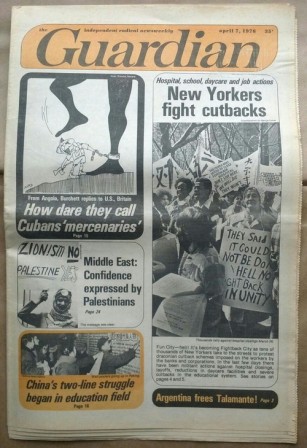
Starting in 1973, a number of organizations in the New Communist Movement, with a few years’ experience and modest growth, and in the face of a sharp decline in the mass radicalism characteristic of the late 1960’s, positioned themselves to take on party building as their immediate goal (a previous effort to unite Marxist-Leninists, the journal Proletarian Cause, only lasted a single issue). They had began as local collectives and then successfully formed cadre organizations with operations in a number of cities. Unlike Progressive Labor in the 1960s, which moved from “Movement” to “Party” with a cadre core inherited from a factional split from the original CPUSA, the new communist groups came mainly from the more loosely organized radical student movements.
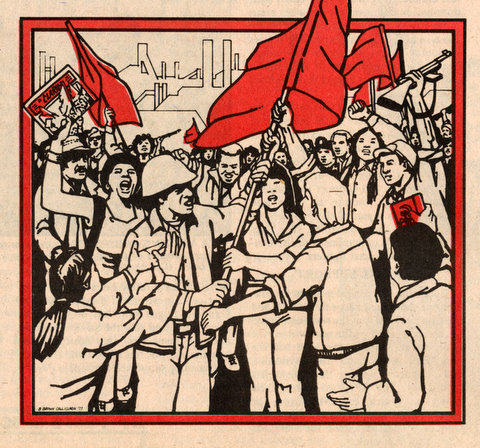
The main groups – the Revolutionary Union (RU), the October League (OL) and the Communist League (CL) – initially engaged one another on various questions related to party building and communist theory and practice. These interactions found their main public expression in the 1973 “party-building” forums organized by the New York-based Guardian weekly, the main voice of the independent left since 1948. The Guardian began with an ecumenical attitude toward most of the groups, though it kept the CL at arm’s length (and it was not included in the forums). The paper’s staff at the time included supporters of both the RU and the OL. While the Guardian forums did not bring the participating groups closer together, it did bring the emerging Marxist-Leninist forces and their perspectives to the attention of the broader U.S. left.
However, interaction soon turned into competition between these “pre-party formations.” Each group initiated discussions with interested smaller groups and individuals, drew out points of unity and difference, and tried to win over participants to its own approach, line and agenda, while breaking with those it failed to bring in. Each in its own way tried to emulate the Bolshevik experience, many using Lenin’s “What Is To Be Done?” as key reference point.
The first major party-building organizational effort was the National Liaison Committee (NLC) initiated by the RU in 1972, which included the Puerto Rican Revolutionary Workers Organization (formerly the Young Lords Party), the Black Workers Congress, and other new communist groups, but excluding CL and OL. Differences over the national question resulted in the collapse of the NLC in 1974.
During this same period, the CL began talks with the American Communist Workers’ Movement (M-L), the New Voice, and others, resulting in the calling of a Conference of North American Marxist-Leninists and the subsequent formation of the National Continuations Committee (NCC) in 1973. It, too, failed to hold together and after most of the participating groups departed the NCC, CL served as the core of the Communist Labor Party, which was launched in 1974.
The failures of the NLC and the NCC to take the New Communist Movement to a new stage of unity marked a turn toward increased in-fighting among U.S. Marxist-Leninists throughout the ’70s. The national papers of the major groups – the RU’s Revolution, the OL’s The Call, and the CL’s People’s Tribune – were a central site of these polemics, as was the Guardian through staff writers like Carl Davidson and Irwin Silber.
Party building efforts would continue in 1975-77, with the formation of the Revolutionary Communist Party in 1975, the rise and fall of the “Revolutionary Wing,” in 1975-76 and the creation of the Communist Party (Marxist-Leninist) in 1977 (documented in the next section of EROL). But these developments would occur in the context of a growing crisis inaugurated by changes in Chinese foreign policy, the reversal of the Cultural Revolution after Mao’s death, China’s turn toward an alliance with the U.S. against Soviet influence, and Albania’s rejection of China’s “three worlds theory.”
Family Tree Chart of U.S. Anti-Revisionism, 1956-1977 by the Communist Workers Group (Marxist-Leninist)
Tirana Builds an Internationale Part One: The Struggle Against Modern Revisionism; Part Two: The Albanian Intervention; Part Three: Rally for Enver; Part Four: After Enver by woodsmokeblog
Why U.S. Maoists Foil to Form ’New Communist Party’, by Jon Hillson
Maoists Attempt To Form National Party by Bill Evers [from the Stanford Daily]
Maoist Fusion Fizzles by Young Spartacus
Where the Maoists Stand Today by Jon Hillson [Young Socialist Discussion Bulletin, Vol. 18, No. 6, December 1974]
History of Two-Line Struggle on Party-Building by the Committee for Scientific Socialism (M-L)
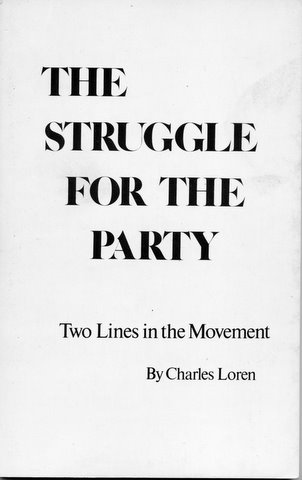
The Struggle for the Party by Charles Loren
Which Side Are You On? [On Loren’s The Struggle for the Party] by Carl Davidson
Reply to Davidson on party-building by Charles Loren
Reply to Carl Davidson [On Loren’s The Struggle for the Party] by the San Francisco Marxist-Leninist Organization
New Pamphlet Parrots Old Opportunism [On Loren’s The Struggle for the Party] by the Revolutionary Union
* * *
Class Struggle vs. S.L.A. Terrorism: A Communist Analysis by Marxist-Leninist Study Group
Burning Questions of Party Building with An Outline for the Study of Marxism-Leninism by The Marxist-Leninist Education Committee (S.F. Bay Area)
Our Present Tasks by Lawyers for Party Building, San Francisco
Against Revisionism by Michael A. Miller, The League for Proletarian Revolution
Party Building, the Central Task of Communists in Uncompromising Struggle Against Opportunism by the Puerto Rican Revolutionary Workers Organization
Line Struggle on Party Building in the U.S. Communist Movement by the Puerto Rican Revolutionary Workers Organization
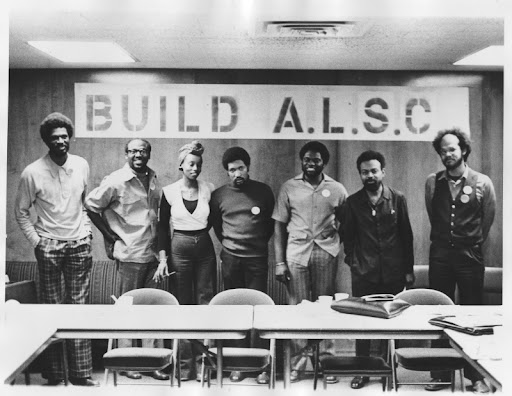
During September, 1971, Owusu Sadauki, director of Malcolm X Liberation University and a leader in the Revolutionary Workers League, and other Black activists made a trip into the liberated areas of Mozambique as a guest of FRELIMO. On his return, Sadauki called together a group of people who met in Greensboro, North Carolina to talk about concrete ways to support liberation struggles in Africa. The result of this meeting was the selection of May 27, 1972 – the Saturday closest to the May 25 Organization of African Unity’s World Solidarity Day – as a day of mass mobilization of Black people in the United States.
ALSC grew out of the first African Liberation Day (ALD) on May 27, 1972 that drew some 60,000 demonstrators in cities across the U.S., Canada, and the Caribbean over 30,000 demonstrated in Washington; 4,000 in San Francisco; 3,000 in Toronto, Canada; 8,000 in Antigua; 4,000 in Dominica; and 2,000 in Grenada. There were also smaller demonstrations in New Orleans, Detroit, and in several other cities.
Following the ALD-1972 demonstrations work began to consolidate the gains that had been made. On September 30, a decision was made to drop the African Liberation Day Coordinating Committee designation and rename the committee the African Liberation Support Committee (A.L.S.C.). The name change signaled a change of emphasis from a single day of mobilizations to a day-to-day involvement in struggle against the twin evils of Black oppression and world imperialism. On February 10, 1973, in Chicago the plans for ALD-1973 were finalized.
African Liberation Day-1973 was an even greater success than the previous year’s demonstration. Over 100,000 people in over 30 cities in the U.S. Canada, the West Indies, England, and Africa were simultaneously mobilized on May 26th.
After ALD-1973, a national retreat was planned in order to: evaluate the past year’s work; formulate an ideological position; develop a program; reorganize the national organizational structure; and elect national officers.
The retreat was held in Frogmore, South Carolina June 28 through July 1, 1973. 21 locals and 5 regions were represented, over 70 people in total. There was a consensus at the retreat that, because of a lack of ideological clarity, ALSC had reached a crisis. In response, Sadaukai, Abdul Alkalimat, of the Peoples College and Revolutionary Workers League, Nelson Johnson of the Youth Organization for Black Unity (YOBU), and other leading ALSC members proposed that it articulate an official Marxist-Leninist political line. Ultimately, a national position paper and statement of principles was unanimously adopted. Its key points were:
A. The new unity of the Black liberation struggle must be anti-racist, anti-imperialist and anti-capitalist in character;
B. The struggle to unite Black anti-imperialist forces is our source of strength in building an ideologically advanced movement;
C. Our unity must involve all social groups and class formations, but we propose that BLACK WORKERS TAKE THE LEAD.
The decisions of the Frogmore meeting were met with heated opposition by a number of non- and anti-Marxist Black nationalist ALSC cadre, many of whom withdrew their support immediately following the Frogmore meeting.
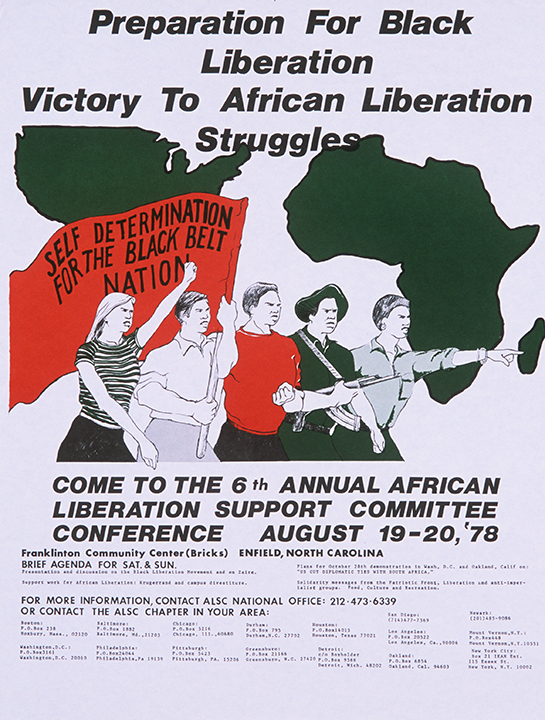
Yet, despite this loss of support, resources and membership, ALSC organizers expanded their efforts in 1974, declaring May “African Liberation Month.” In addition to the annual ALD demonstration, special programs were organized around Malcolm X’s birthday (May 19) and the first national ALSC conference was slated to take place prior to the May 25 ALD events. Organized under the theme “Which Road Against Racism and Imperialism for the Black Liberation Movement?” the national conference took place on 23–24 May 1974 at Howard University and drew approximately 800 participants. In addition to Sadaukai, Alkalimat and other ALSC organizers, the delegates included Amiri Baraka, Stokely Carmichael, and scores of activists affiliated with YOBU, NBPA and various New Communist Movement groups.
In his published report on the conference, former SNCC national chair Phil Hutchings noted that, unlike previous black power conferences, this conference, “dealt with problems of a theoretical nature as a precondition for base-building and renewed emphasis on organizing new strata within black communities, particularly, black workers.” The adoption of a document, “Toward Ideological Unity of the ALSC,” confirmed this direction as well as the hegemony of Marxist-Leninists within the organization. Hutchings suggested that this process of ideological clarification was necessary for the positive development of the ALSC, but Cedric Johnson has argued that “the increasing preoccupation of many radical activists with developing the ’correct line’ had the opposite effect. Instead of popularizing radical ideals, the ’two-line struggle’ within American black radical circles dissolved into parochialism and marginality. ”
The August 1974 meeting of the International Steering Committee of ALSC in Houston illustrated the extent to which NCM forces were in control but bitterly divided over strategy and line. Present at the meeting were representatives of the Revolutionary Union, Black Workers Congress, October League, and the Congress of Afrikan People as well as the SWP.
The consequences of the struggles among these groups were dramatically manifested during the 1975 ALD observations. In place of a single diverse demonstration of pan-racial solidarity and anti-colonialism, the 1975 ALD mobilization fractured sharply along ideological lines. In Washington, DC, for example, there were three marches: one, organized by the All African People’s Revolutionary Party (AAPRP); another sponsored by the Socialist Workers Party, and a third by Baraka and the Congress of Afrikan People.
1976-78 continued to see sharp struggles within the ALSC as various NCM groups jockeyed for power and influence at the national level and in state and local chapters. A particular factor in these struggles was the influence of the international line of the Communist Party of China on various NCM groups as it applied to Africa. Thus, while the Revolutionary Communist Party (RCP) and Revolutionary Workers Congress (RWC) asserted that U.S. Imperialism was the main threat to African liberation struggles, the Workers Viewpoint Organization (WVO) argued that the USSR, as the rising and more aggressive superpower, was the main threat.
As a result of these differences, again in 1977 there were multiple African Liberation Day marches and rallies, ones called by the ALSC and WVO with its slogans, and others, organized by the RCP and RWC, through the African Liberation Day Coalition, with its own.
By the early 1980s the ALSC was in terminal decline.
* * *
[EROL Note: Many of the documents reproduced below are from the Abdul Alkalimat website. We are grateful to Professor Alkalimat for making them available.]
Historical Background. African Liberation Support Committee [from ALSC Handbook #1] [1973]
1st Draft of General Congress of Afrikan People Summation: National African Liberation Support Committee – 1972-75, Part 1; Part 2; Part 3 [1975]
Brief History of ALSC’s Program of Work by the Workers Viewpoint Organization [1977]
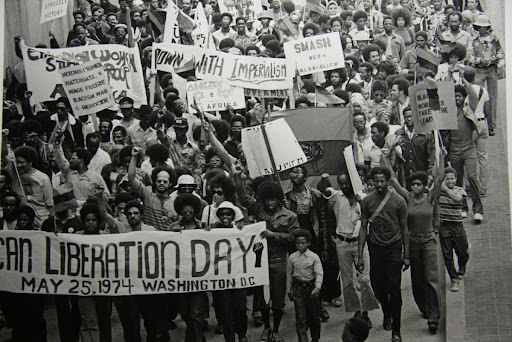
Black Congress Calls African Liberation Day by Malik Miah [The Militant, March 2, 1972]
’African Solidarity Day’ Set for May 27 by Abe Weisburd [1972]
The African World Editorial: ALD Significance, The African World, May, 27, 1972
African Liberation Day! Black Panther Intercommunal News Service [1972]
35,000 march for African fighters by Abe Weisburd [1972]
African Liberation Day Actions by Derrick Morrison [1972]
African Liberation Day demonstrations set by Baxter Smith [The Militant, April 13, 1973]
New support for May 26 by Baxter Smith [The Militant, May 25, 1973]
A.L.D. Success 1000s March in Newark [1973]
African Liberation Day 100,000 march [1973]
May 26 Protests Hit U.S. Role in Africa by Baxter Smith [1973]
5,000 March on White House on African Liberation Day by Norman Oliver [The Militant, June 7, 1974]
African Liberation Day 1975 [The Militant, June 13, 1975]
African Liberation Day: Thousands Say No to Imperialism [1975]
Afrikan Liberation Day 1975 in Newark by the Congress of Afrikan People [Unity & Struggle, Vol. 4, No. 9, June 1975]
D.C. Thousands Rally for African Liberation by Omari Musa [The Militant, June 10, 1977]
Masses Support African Struggles by the Marxist-Leninist Organizing Committee [Unite!, Vol. 3, No. 6, July 1977]
African Liberation Day by the August 29th Movement
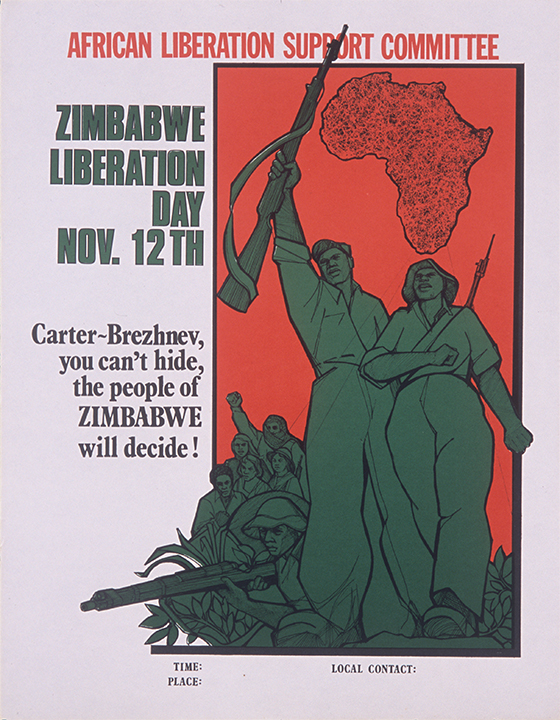
ALD Committee Continues to Work, The African World, August 19, 1972
African Liberation Support Committee: Proposal for a United Front Strategy [Prepared for the ALSC Retreat, Frogmore, N.C.] by the Peoples College
Was African Liberation Day ’escapist’? Answer to ’Muhammad Speaks’ by Malik Miah
An Open Letter to SCLC Leaders [from the Atlanta African Liberation Support Committee]
ALSC Completes Southern Conf., The African World, December 1973
Work of the African Liberation Support Committee's Africa Office, The African World, December 1973
African Liberation Support Committee Statement of Principles [Adopted at the ALSC Retreat, Frogmore, N.C.]
Summary, Debate Plans Mark ALSC Conference, The African World, March 1974
African Liberation Month Linked to Struggle Here by the October League (M-L)
Conference Call: ALSC National Conference, May 23-24, 1974
Toward the Ideological Unity of the African Liberation Support Committee: A Response to Criticisms of the ALSC Statement of Principles Adopted at Frogmore, North Carolina by Abdul Hakimu Ibn Alkalimat and Nelson Johnson
Afrikan Liberation Day and ALSC Conference on Racism and Imperialism! by the Congress of Afrikan People
ALSC Conference on Racism and Imperialism, [including reports on workshops and texts of presentations delivered by Muhammad Ahmad, Abdul Alkalimat, Stokely Carmichael, Kwadwo Akpan, Owusu Sadaukai, and Immamu Baraka] The African World, July 1974
A Scientific Approach to Black Liberation: Which Road Against Racism and Imperialism for the Black Liberation Movement? by Abdul Alkalimat
Reflections on the August 1974 ALSC Meeting in Houston by Abdul Alkalimat
Afrikan Liberation Day 1975 by the Congress of Afrikan People [Unity & Struggle, Vol. 4, No. 7, May 1975]
ALSC. Dangers of Bourgeois Ideology in the Black Liberation Movement Will be Defeated by Revolutionary Nationalism! by the Congress of Afrikan People [Unity & Struggle, Vol. 4, No. 12, August-September 1975]
ALSC Future Debated, The African World, September 1975
Future Of Afrikan Liberation Support Committee Discussed In D.C. Meeting by the Congress of Afrikan People
ALSC: Continuations Committee of ALSC At The Crossroads, While U.S. Imperialism and Soviet Social Imperialism Contend For Afrika!! by the Congress of Afrikan People
ALSC National Meeting Held in New York by the Congress of Afrikan People
Afrikan Liberation Day 1976 by the Congress of Afrikan People
Support Afrikan Liberation Day!! by the Congress of Afrikan People
On the Role of the Revolutionary Workers League in the ALSC by the Committee for Scientific Socialism (M-L)
Wreckers Cripple African Liberation Support Committee by the October League (M-L)
Build the ALSC! by the Marxist-Leninist Organizing Committee [from Unite!, Vol. 2, No. 5, October-November July 1976]
Build ALSC into a Mass Fighting Organization Workers Viewpoint Organization Position Paper submitted to ALSC National Conference 8/76
ALSC: RWC Paves Way for RCP Takeover by the Workers Viewpoint Organization
African Liberation Day 1977: Some Strategic and Tactical Considerations for Building the United Front Against Imperialism by Abdul Alkalimat
African Liberation Day 1977: Fight Imperialism and National Oppression from USA to USA! by Abdul Alkalimat
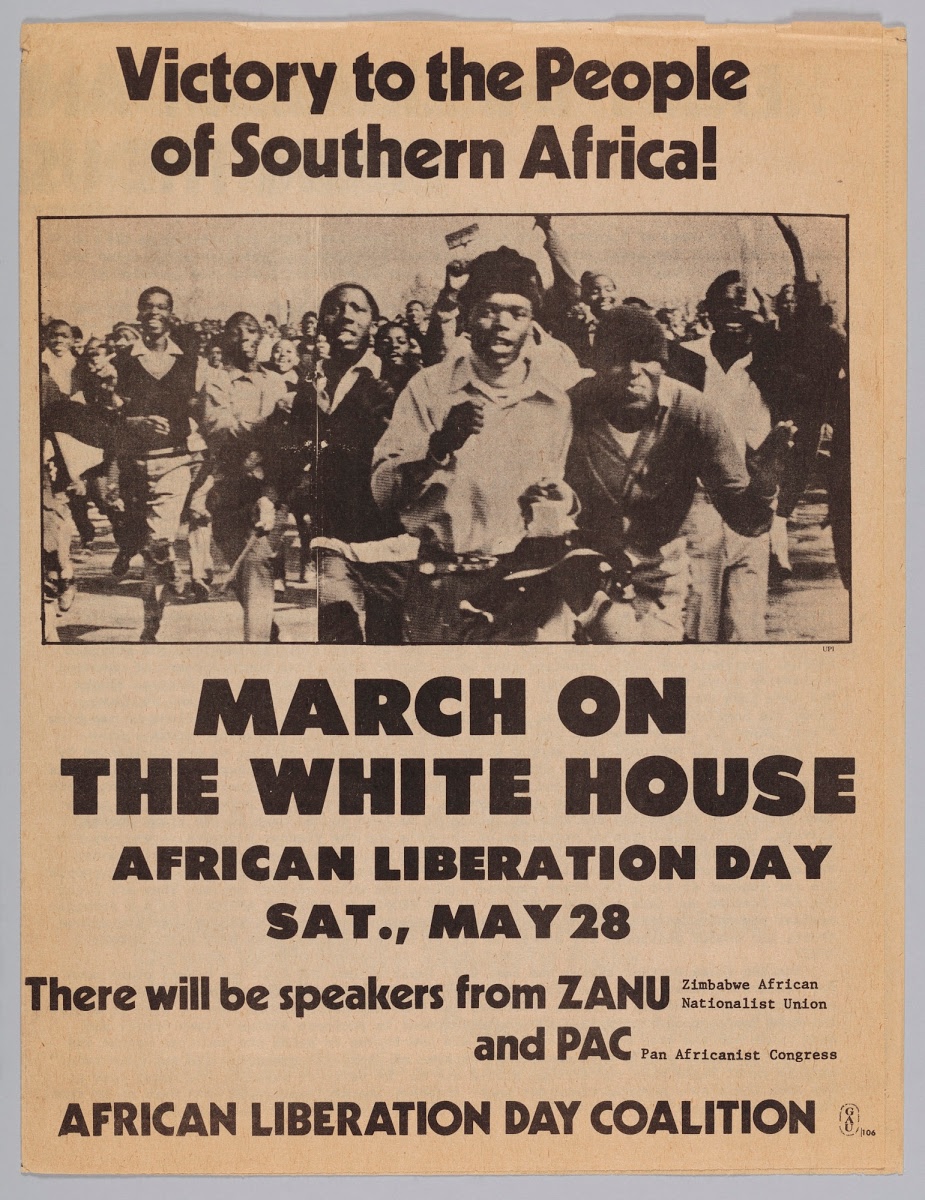
March on White House African Liberation Day! by the Revolutionary Communist Party
The African Liberation Support Committee by the Marxist-Leninist Organizing Committee [from Unite, Vol. 3, No. 3, April 1977]
Rebuild ALSC by Correcting Methods of Leadership by the Workers Viewpoint Organization
All Out for African Liberation Day! by the Workers Viewpoint Organization
Hail African Liberation Day! by the Revolutionary Communist Party
RCP Exposed! by the Workers Viewpoint Organization
1600+ March for African Freedom by the Revolutionary Communist Party
African Liberation Support Committee Holds Victorious African Liberation Day by the Workers Viewpoint Organization
ALSC – Forward to National Conference! by the Workers Viewpoint Organization [from Workers Viewpoint Supplement, July 1977]
RCP/RWC Attempt to Con Black Masses by the Marxist-Leninist Organizing Committee
ALD May 28: Oppose Both Superpowers by the Revolutionary Communist League (M-L-M) [from Unity and Struggle, Vol. VI, Nos. 1-6, May-June 1977]
African Liberation Support Committee Holds Successful National Conference by the Workers Viewpoint Organization
ALD Militant Tradition Continued! by the League for Proletarian Revolution (M-L)
WVO’s Hegemonism Wrecks and Splits ALSC by the Revolutionary Communist League (M-L-M)
African Liberation Day Demo Set for Detroit by the Revolutionary Communist Party [from Revolution, Vol. 3, Nos. 6, March 1978]
Broaden the United Front, Tighten the Core: All Out for African Liberation Day! by the Workers Viewpoint Organization
Correct United Front Effort Speeds Up ALD Momentum: 45 Colleges Endorse ALD by the Workers Viewpoint Organization
ALD: Support African Peoples’ Struggles by the Revolutionary Communist Party
Opportunists Flaunt Reformism in ALD Actions by the Revolutionary Communist Party
Strengthen A.L.S.C. Through Vigorous Mass Line to Lead Struggles Ahead by the Workers Viewpoint Organization
ALSC-NSC Meets: Sharp Line, Strong Leadership. Mass Line, Self-Criticism Wins People’s Hearts and Minds by the Workers Viewpoint Organization
Revisionist “C”PUSA Calls in the Cops to Attack ALSC by the Workers Viewpoint Organization [from Workers Viewpoint, Vol. 3, Nos. 11, November 1978]
International Situation: Opportunism of All Sorts Covers for Revisionism and Soviet Social-Imperialism by the Workers Viewpoint Organization
ALD 1979: The Party and ALSC Put the Bourgeoisie on Notice by the Workers Viewpoint Organization
African Liberation Day – 1980 by the Revolutionary Communist Party
Thousands join African Liberation Day events by the Communist Party (Marxist-Leninist) [from The Call, Vol. 9, Nos. 22, June 2, 1980]
Finally Got the News, Vol. 1, No. 1, October 1974
Finally Got the News, Vol. 1, No. 2, December 1974
[Back to top]
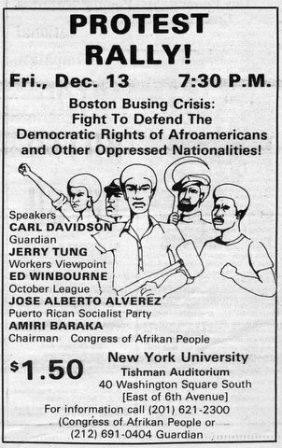
Boston: Busing Crisis Stirs Class Divisions by the Communist Labor Party[from People’s Tribune, Vol. 1, No. 1, September 1974]
Which Side Are You On? [on the RU’s Boston busing position] by Carl Davidson
Afro-American Self-Determination [on the RU’s Boston busing position] by the October League (Marxist-Leninist)
Stop Boston Racist Attacks, Defend Right of Self-Determination by the October League (Marxist-Leninist)
Reprinted from Struggle Newspaper: White Reactionaries in Revolutionary Trimmings
Maoists Join Segregationists in Boston by Dave Frankel [The Militant, November 8, 1974]
Boston busing used to divide working class On the Move, Vol. 1, No. 3, November 1974
Boston Busing Struggle Sharpens by the Revolutionary Union
Main Lesson of Boston Busing Struggle by the Revolutionary Union
Which Way Will RU March on Dec. 14? by Wendy Lyons [The Militant, December 6, 1974]
The Desperate OL Concocts Lurid Tales by the Revolutionary Union
March against Racism: Join Fred Hampton Contingent by the October League (Marxist-Leninist)
Progressive United Front on Education calls for: “Self-Determination and Quality Education in Boston” by the Congress of Afrikan People
Boston... Fred Hampton Contingent Gives Critical Support for Boston March by the Congress of Afrikan People
Monopoly Capitalists’ Anti-Busing Movement is an Attack on the Democratic Rights of the Black People and on the Unity of the Working Class by the Central Organization of U.S. Marxist-Leninists
500 attend busing forum in N.Y.
20,000 March for Freedom: Hampton Contingent Provides Backbone by the October League (Marxist-Leninist)
In Boston – Revolutionary Storm Assaults Racists and Reformists by the Puerto Rican Revolutionary Workers Organization [Palante, January 1975]
The Boston Busing Crisis: Liberalism as the Breeding Ground for Fascism [published in the theoretical journal of the Communist Labor Party]
Busing – A Fight for Equality by the Communist Labor Party [from People’s Tribune, Vol. 2, No. 1, January 1975]
Busing: A Fight for Equality by the Communist Labor Party
Busing march misses target On the Move, Vol. 1, No. 5, January-February 1975
Boston Busing: fight divide and rule schemes by the Revolutionary Union [from On the Move, Vol. 1, No. 5, January-February 1975]
The Boston Busing Crisis: Liberalism as the Breeding Ground for Fascism [from the Communist Labor Party journal, Proletariat]
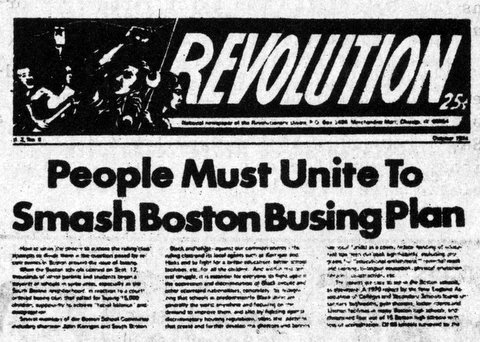
Busing: A Fight for Equality [from the Communist Labor Party journal, Proletariat]
The Boston Forced Busing Plan: The Dialectics of Bourgeois Formal Democracy and Fascism by Workers Viewpoint
Fight the Bosses, Not the Buses by the Progressive Labor Party
Fascism and Busing in Boston by the Progressive Labor Party
Boston, ’75 by the Progressive Labor Party
“It’s Not the Bus”: Busing and the Democratic Struggle in Boston, 1974-1975 by the Proletarian Unity League
Anti-Marxist Line: Workers Viewpoint Attacks Busing by the October League (Marxist-Leninist)
Boston Busing: Phase Two Phases Out Education by The New Voice
Fighting Worker Response to the Boston Busing Crisis (1974-1976)
Desegregation: Another look. One activist thinks that school desegregation is not always desirable, and can even hurt minorities by John Martin
Views Changing: Does Busing Fight Racism? by The New Voice
Debate on How to Fight Discrimination: Keep segregation under fire by Carl Davidson
[Back to top]
The journal Proletarian Cause, of which only a single issue appeared, in September 1972, was initiated by Bill Epton in a effort to unite anti-revisionist Marxist-Leninists around the county in building a new Communist Party.
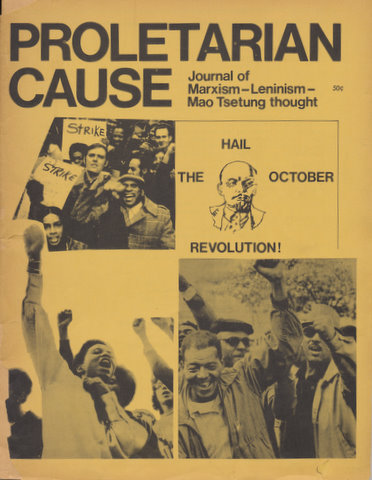
Epton had been a prominent leader in the Progressive Labor Party, but was expelled from the organization in 1970 around issues of Black nationalism and PLP strategy and tactics in the Black Liberation Movement (for more on Epton’s expulsion and this struggle in PL see Chapter 3 of Jim Dann and Hari Dillon’s The Five Retreats. Thereafter, in the fall of 1971, Epton contacted a number of former PL members and Marxist-Leninist groups about participating in a new anti-revisionist theoretical journal – Proletarian Cause. While a number of meetings of journal participants were organized, after the first issue, the group was not able to agree on an editorial policy for the magazine and no further issues appeared.
Charles Loren, who participated in the Proletarian Cause project, described it in Chapter Six of his The Struggle for the Party:
In the fall of 1971, for example, the attempt began to organize a theoretical journal of Marxism-Leninism, later called Proletarian Cause. Organizing conferences were held with power to choose members of the editorial board of the magazine; the meetings were open to practically anyone. All one had to do was 1) to declare oneself an adherent of Marxism-Leninism-Mao Tsetung Thought, 2) be against Progressive Labor Party (the period in the stormy life of that organization did not matter, or rather, no distinction was made between the various periods of PL), and 3) it was necessary to have heard when and where the meetings would be held. From such a beginning some of the founders of this venture actually hoped to form the skeleton of a future communist party. In this particular case, one group of persons (including this author) pointing out the need for the centralist method of organization a-round people of proved Marxism-Leninism was frozen out fairly early; then the group split again on the issue of whether there were to be any editorial standards at all by which to choose what to put into the magazine! Finally, the project collapsed after one issue.
[Back to top]
In 1973, the Guardian newspaper launched a series of public forums in New York, presenting the views of the some of the main groups in the early new communist movement.

The Guardian was a national, New York-based weekly that represented the independent far left in the U.S. after WWII. It was founded in 1948 by professional journalists involved in the Progressive Party presidential campaign of New Dealer Henry Wallace. The ill-fated Wallace campaign came in response to the rightward shift of the Democratic Party under the Truman administration. The PP was supported by the Communist Party, but included many non- and ex-Communists, some of whom stood to the left of the CP.
The Guardian’s contributors included such figures as Anna Louise Strong and Felix Greene, strong supporters of the People’s Republic of China in the days when it was a pariah state in the west. After the Sino-Soviet split, the paper offered coverage of China that not available in either the liberal or the CP press. The Guardian’s independent, but generally non-sectarian stance helped it maintain a base of support among Old Leftists. New Leftists turned to it for sympathetic coverage of the civil rights, antiwar, student left and women’s movements, and struggles in the Third World.
After a series of leadership fights in the mid-to-late 60s, the Guardian’s political direction consolidated around two editors, Jack A. Smith and Irwin Silber, both of whom sympathized with the RYM II faction that formed at the end of SDS in 1969 [for RYM II’s background and documents, see “Revolutionary Youth Movement II”]. As Beijing began looking for an opening for interaction with the U.S. in 1970, the Guardian was a natural starting point. The paper became a major platform for China’s foreign policy, and launched some of the first U.S. tours since the Cultural Revolution. While not Maoists, Smith and Silber were interested in creating both a business and a political relationship with Beijing. They saw in the new communist movement a potential revolutionary, China-friendly party.
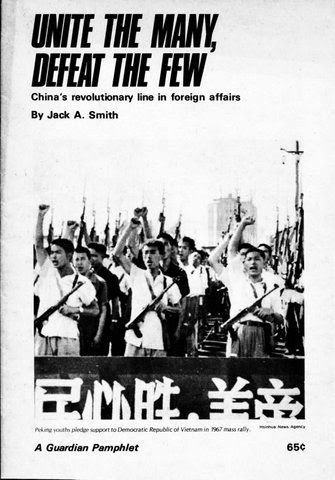
Four forums were held in 1973: on “Which Road to Building a New Communist Party?”, the “Question of the Black Nation”, “Women and the Class Struggle”, and “Roads to Building a Workers’ Movement.” Two additional forums were held in 1974, on Watergate and on the Boston busing crisis.
The forums involved the two largest New Communist Movement groups: the Revolutionary Union and the October League (ML), as well as the Guardian itself, the Black Workers Congress, I Wor Kuen, the Puerto Rican Revolutionary Workers Organization, and others unassociated with the CP, Progressive Labor or Trotskyism. The organizers shunned the Communist League, but included non-Maoist groups like Harpers Ferry Organization (affiliated with Sojourner Truth Organization), the Third World Women’s Alliance, the pro-Havana Puerto Rican Socialist Party, and the New American Movement.
The forums informed the broader movement about the new communists more directly than the groups themselves were able to do at that early point in its development. The first forum, on building a new communist party, was attended by more than 1,200 people, and transcripts and tapes of the events circulated nationally.
The Guardian Sets Out to Build a New Maoist Communist Party by Dan Rosenshine
Speech by Irwin Silber of the Guardian
Speech by Michael Klonsky of the October League
Speech by Mike Hamlin of the Black Workers Congress
Speech by Don H. Wright of the Revolutionary Union
Speech by Irwin Silber of the Guardian
Speech by Michael Klonsky of the October League
Speech by Mike Hamlin of the Black Workers Congress
Speech by Don H. Wright of the Revolutionary Union
Guardian forum poses: ’Question of Black Nation’
Unity, struggle at Guardian forum: ’Women and Class Struggle’
Speech by Karen Davidson of the Guardian
Speech by Mary Lou Greenberg of the Revolutionary Union
A feminist replies to the Revolutionary Union by Rosario Morales
Role of Women’s Movement Debated at Guardian Forum by The Call
Road for workers: Debate at Guardian Forum
Editorial: Sectarian Attack at Guardian Forum by The Call
Hundreds attend forum on Watergate
United Front against Monopoly Capitalism or United Front against Fascism – Watergate and Fascism .... by Workers Viewpoint Organization
Bad Caricature [letter from Dave Davis to The Guardian]
500 attend busing forum in N.Y.
[Back to top]
By the early 1970s, many currents within the New Communist Movement concluded that the time had come to consolidate into a new, multinational, anti-revisionist communist party. By then, a number of national organizations had developed analysis and theory on some basic issues. As a result, the movement was capable of an increasingly sophisticated interaction between actual organizations.
At the same time, the great upsurge of the late 60s and early 70s suddenly cooled out. Though it was not clear to everyone involved, a period of political ebb had arrived. In that context, some important radical forces (like the Black Panther Party) were suddenly shattering and retreating, while others more and more urgently felt the need to consolidate organizationally.
One of the most important attempts at party-formation in this period was the National Liaison Committee (NLC). Formed without publicity in 1972, it included the Revolutionary Union (RU), the Black Workers Congress (BWC), the Asian-American group I Wor Kuen (IWK), and the Puerto Rican Revolutionary Workers Organization (PRRWO, formerly the Young Lords Party). A joint national speaking tour was organized, and a framework developed for conducting common political work at the local level.
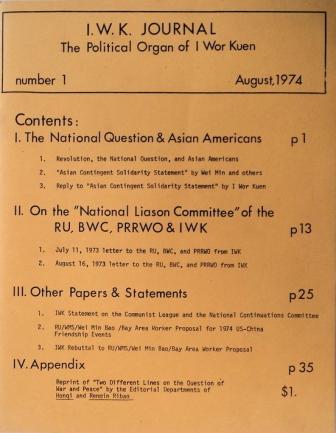
The NLC originally aimed at a negotiated merger based on a common party program and Marxism-Leninism, Mao Tsetung Thought. However, after some initial optimism and excitement, the project fell apart with bitter recriminations. Major differences remained over key political and organizational matters, and the participants were not able to overcome them.
These line differences concentrated around organizational matters of leadership. Those communists emerging from the Black and Puerto Rican liberation struggles held to the idea that, even in a future multinational party, there would have to be a special role for “third world leadership.” They expressed concerns about being overwhelmed (and simply absorbed) by the largest group in the NLC – the more consolidated, nationally organized, and largely-white Revolutionary Union.
The concerns stemmed from immediate experience. There had been a long struggle within the Black Liberation Movement for African American leadership – which included the expulsion of white people from SNCC. As a result, African American communists found it hard to accept “white leadership” within a new multi-racial party, and anticipated that the Black community would not accept such a party as the leadership of its struggles.
At the same time, the RU had, over the previous two or three years, submerged itself more and more in “rank and file organizing” among industrial workers in factories – and the politics of sections of the RU had increasingly moved toward the position that the 1960s dominance of internal national liberation struggles (i.e., the African American, Chicano, and Puerto Rican movements) in the U.S. movement was fading, and the coming revolutionary movement would now be defined by the common struggle of the multi-national working class.
Because of their concerns and line, the BWC and PRRWO insisted that the process of party formation should be postponed until the Black, Puerto Rican, Chicano and Asian-American communist organizations had developed significantly more heft (and partisan support in their communities), so that that Third World communists could better play a leading role within the future party and the future revolutionary leadership. They were opposed to having the RU leader, Bob Avakian, chosen as the future party chairman.
The collision over these two issues (of timing and chairmanship) resulted in a sharp eruption of mutual polemics over an RU document called “National Bulletin #13,” which argued that communists were fundamentally defined by internationalism and that even revolutionary forms of nationalism were (ultimately) bourgeois.
The final collapse of the NLC also involved a sharp struggle within the RU itself. The RU representative on the NLC, D.H. Wright, essentially went over to the BWC/PRRWO position and attempted to split the RU along racial lines. The attempt failed, and Wright left with only a handful of supporters. By May 1974, the NLC broke up.
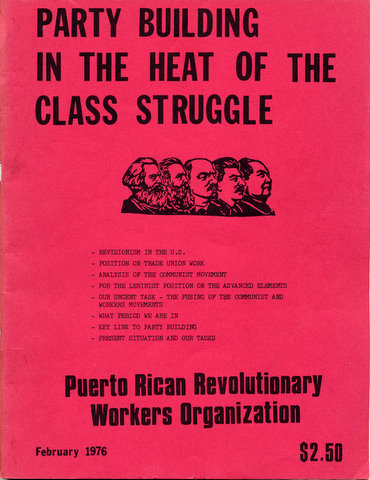
The RU argued that the problem had been “Bundism” – i.e. the inability of some communists to break out of a framework that combined communism uneasily with various forms of revolutionary nationalism, preventing the formation of a genuinely multinational and genuinely communist party. (“Bundism” was Lenin’s term for non-territorial Jewish nationalism in the pre-revolution Russian socialist movement, which manifested itself in the Jewish Labor Bund.)
From the other side, the RU was accused of white chauvinism and an inability to accept leadership from Third World forces – a charge that was soon amplified by the RU’s decision, in the summer of 1974, to oppose Boston’s affirmative action plan of busing Black public school students to segregated white schools, and to propose united working class resistance to that plan. It was a stark departure from the RU’s previous history of militant support for the Black Liberation struggle – and virtually guaranteed that they would be unable to unite with other communist forces in building a common party.
RCP Rewrites History of National Liaison Committee
How RCP Defends Chauvinism and Anti-Party Blocs. A Reply to ’The Communist’ on the National Liaison Committee by An Observer
On “The National Liason Committee” of the RU, BWC, PRRWO and IWK by I Wor Kuen
Two Letters from IWK to the National Liaison Committee by I Wor Kuen
The Puerto Rican Revolutionary Workers Organization and the National Liaison Committee by I Wor Kuen
Maoísmo ascendente y repressíon del FBI en Estados Unidos: 1968-1978 by Aaron J. Leonard and Conor A. Gallagher
The Black Liberation Struggle, the Black Workers Congress, and Proletarian Revolution by the Black Workers Congress
Red Papers 6: Build the Leadership of the Proletariat and its Party by the Revolutionary Union
Narrow Nationalism: Main Deviation in the Movement on the National Question by the Revolutionary Union
The Struggle Against Revisionism and Opportunism: Against the Communist League and the Revolutionary Union by the Black Workers Congress
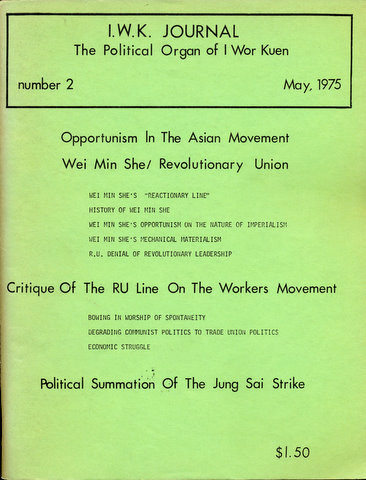
Which Side Are You On? [On RU and “Narrow Nationalism”] by Carl Davidson
V.I. Lenin by the Revolutionary Union
Build the New Party To Lead the Masses! (Part 1) by the Revolutionary Union
’...fan the flames’ [On Party-Building] by Irwin Silber
Build the New Party To Lead the Masses! (Part 2) by the Revolutionary Union
An Analysis of the Revolutionary Union’s Incorrect Line on Party-building. (Excerpt) by Aileen Armstrong
The Revolutionary Union’s “New Turn” by the League for Proletarian Revolution
Marxism or American Pragmatism? The Right Opportunist Line of the R.U. by Workers Viewpoint
May 1st Workers Movement Formed in Bay Area by the Revolutionary Union
Statement of Views of Three West-Coast R.U. Members [RU internal document] by Steve Hamilton, Larry Harris and Danny Harris
Untitled Paper [critique of R.U.’s policies and lines] [RU internal document] by Steve Hamilton, Larry Harris and Danny Harris
Breaking with RU’s Ultra-’leftism’ by Steve Hamilton, Larry Harris and Danny Harris
Revolutionary Union: Opportunism in a “Super-Revolutionary” Disguise by the October League (M-L)
Critique of the RU Line on the Workers’ Movement by I Wor Kuen
[Back to top]
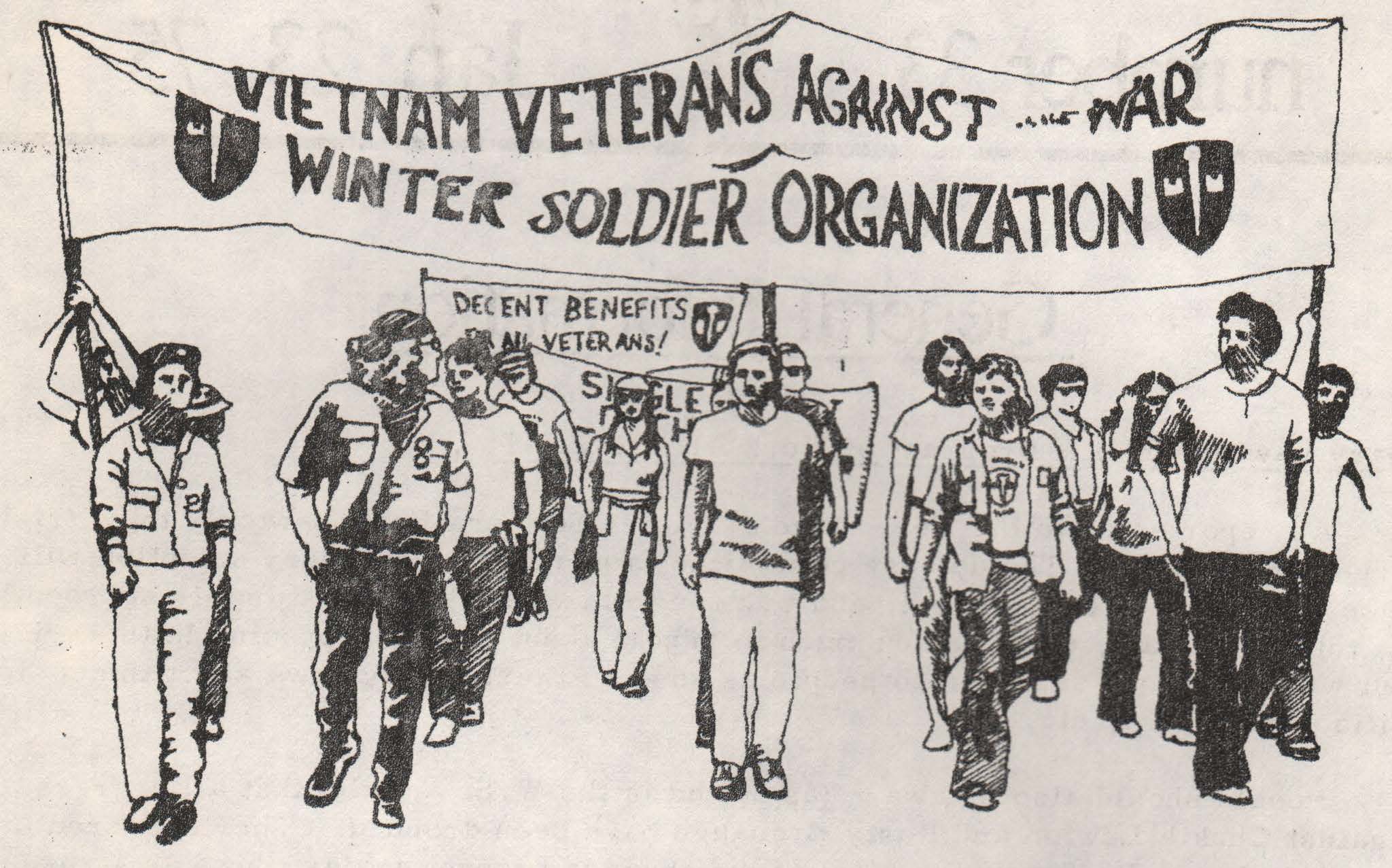
Strengthen the Core, Broaden the Front. VVAW must take the lead in building a mass vets’ movement
VVAW letter of Censure to the Communist Party, USA
Build the Anti-Imperialist Veterans Movement, A collection of articles by the Revolutionary Union
A Position Paper: The Political Statement of the National Collective on the Future of VVAW/WSO
Tell No Lies, Claim No Easy Victories. An Investigatory Paper into the Current Political Struggle Taking Place Within the VVAW/WSO by the Buffalo Chapter
National Office Report to the 13th VVAW/WSO National Steering Committee Meeting August 8-12, 1974, Buffalo, NY
Northern Illinois-Iowa Position Paper: VVAW/WSO is a ’Ship Without a Rudder’ Submitted to the 13th National Steering Committee Meeting
The 13th National Steering Committee Meeting
VVAW Political Education: Classes in America
VVAW Political Education: Black Liberation in America
Building the Anti-Imperialist GI Movement Statement and Proposal by the VVAW National Office
Report: VVAW National GI Conference, October 11-14, 1974
Clarification Paper of National Collective Position Paper on the Future of VVAW/WSO November 1974
What is Vietnam Veterans Against the War-Winter Soldier Organization 1974
National Office Report to the 14th VVAW/WSO National Steering Committee Meeting December 27-31, 1974, St. Louis, Mo.
Working Paper on the Future of the VVAW/WSO by the St. Louis chapter [presented to the 14th National Steering Committee Meeting]
Draft Program Proposal – VVAW/WSO G.I. Organizing [presented to the 14th National Steering Committee Meeting]
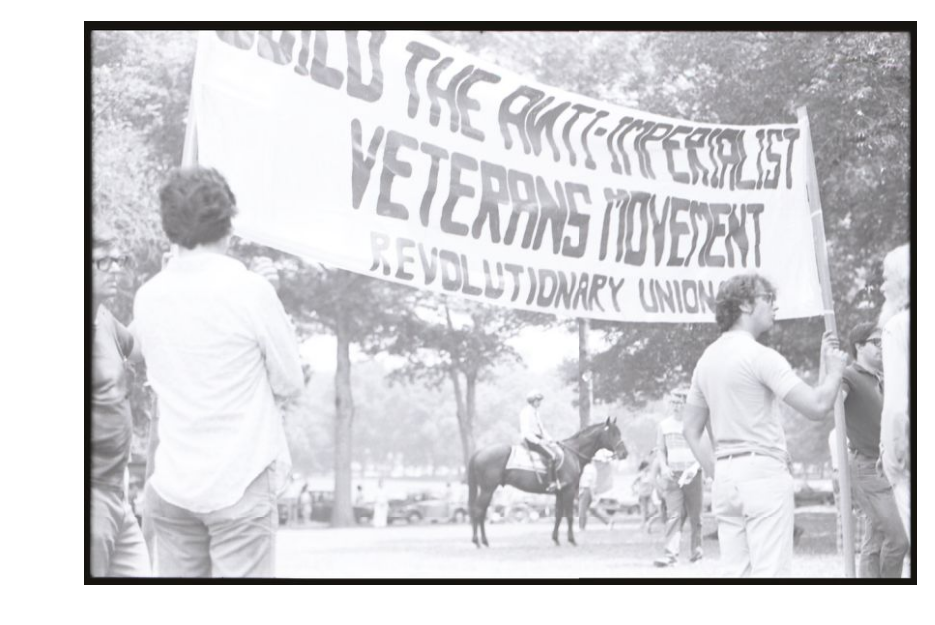
14th VVAW/WSO National Steering Committee Meeting: Report on ’Strategies for Revolution’ Workshop
14th VVAW/WSO National Steering Committee Meeting: Report on ’Program’ Workshop
14th VVAW/WSO National Steering Committee Meeting: Report on ’Mass Organization’ Workshop
14th VVAW/WSO National Steering Committee Meeting: FBI Report on Decision to Affiliate with RU
VVAW Letter to the National Alliance Against Racist and Political Oppression
Notice of Adoption of the ’Fighting Program’ at the 14th National Steering Committee Meeting [VVAW/WSO Newsletter, #33, January 23, 1975]
VVAW-WSO National Meeting Sets New Program
Struggle in VVAW/WSO [Seize The Time, Vol. 1, No. 5, February 1975]
VVAW National Office Fund Appeal
Northern California VVAW/WSO: In a Time of Struggle, An Open Letter to Anti-Imperialist Forces [on RU]
VVAW Letter to the Indochina Peace Campaign
Resignation Letter from Ohio [on RU]
Buffalo Chapter Resigns from VVAW-WSO
Resignation Letter of New York-Northern New Jersey VVAW Regional Coordinator [on RU]
National Office Collective: VVAW Pointing the Way Forward [on the expulsion of the chapters in the Northern California sub-region]
Letter of Anti-Imperialist Caucus of VVAW-WSO [on its forthcoming national meeting, June 27-30, 1975 in St. Louis, Mo.]
FBI Report on the National Meeting of the Anti-Imperialist Caucus of VVAW-WSO [June 27-30, 1975 in St. Louis, Mo.]
National Office Report to the 15th VVAW/WSO National Steering Committee Meeting July 3-7, 1975, Milwaukee, Wisc.
National Office Draft of VVAW/WSO Fighting Program
15th VVAW/WSO National Steering Committee Meeting: Proposal on Expulsion of ’the Faction’
Announcement of the expulsion of the “Anti-imperialist Caucus“ [VVAW/WSO Newsletter, #38, August 12, 1975]
VVAW/WSO Steering Committee Meeting – Organization Takes Big Step Forward by the Revolutionary Union
VVAW decides to file for bankruptcy
RU Cadre Effects on Vietnam Veterans Against the War/Winter Soldier Organization
Inside-Out. Same Struggle-Same Fight! VVAW-WSO newsletter for prisoners
[Back to top]

This party-building initiative began on November 19, 1972 with the issuance of a “Call for a Conference of North American Marxist-Leninists.” The call, initially signed by the Communist Party of Canada (Marxist-Leninist) (CPC (M-L)), the American Communist Workers’ Party (Marxist-Leninist) (ACWM (M-L)), the Communist League (CL) and several smaller, local collectives, was accompanied by the creation of a Preparatory Committee to organize the conference and recruit additional groups.
Increasing differences between the two main U.S. participants in the Preparatory Committee – the ACWM and the CL – saw the conference process collapse in the spring of 1973 amid mutual recriminations, charges and counter-charges.
The CL and those forces associated with it proceeded to hold their Conference of North American Marxist-Leninists on May 24-28, 1973 in Chicago at which time the National Continuations Committee (NCC). (see below for more on the NCC)
The ACWM and those groups associated with it, on the other hand, held their own conference on August 13-28, 1973, at which time they united to constitute themselves as the Central Organization of U.S. Marxist-Leninists (COUSML). (See below for more on COUSML)
The Conference of North American Marxist-Leninists party building process was subject to FBI infiltration through a number of fake Marxist-Leninist groups set up for that purpose, including the Red Star Cadre (Marxist-Leninist) of Tampa, Florida, led by an FBI informant named Joe Burton.
Call for A Conference of North American Marxist-Leninists
Resolution in Support of the North American Conference of Marxist-Leninists by the American Communist Workers Movement (Marxist-Leninist)
Regina Conference, An Historic Turning Point in Party-building in North America
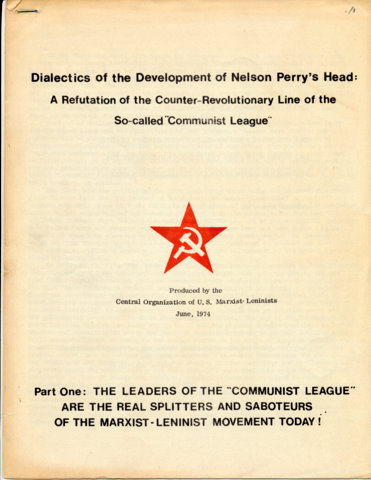
Lexington Collective Supports Call
Conference of North American Marxist-Leninists. Marxist-Leninists Unite! by the Communist League
ACWM (ML) Breaks with Call by the Communist League
Digest of North American Revolutionary Material for Proletarian Revolution, No. 1, June 1973
Announcement of West Coast Propaganda Campaign to Support the Conference of North American Marxist-Leninists North America News Service, July 26, 1973
ARY Propaganda Team of the Northeast Committee of ACWM (M-L) Carries Campaign to Support the Conference of North American Marxist-Leninists into Philadelphia Area North America News Service, July 26, 1973
ARY Propaganda Team Carries Campaign to Support the Conference of North American Marxist-Leninists into the Albany-Troy-Schenectady, N.Y. Area North America News Service, August-1-2, 1973
ACWM (ML) – The Ugly Face of Opportunism by the Communist League
The Dialectics of the Communist League: Double-Dealing, Intrigue and Conspiracy – An Attempt to Liquidate the American Communist Movement by Red Banner (Marxist-Leninist)
Dialectics of the Development of Nelson Perry’s Head. A Refutation of the Counter-Revolutionary Line of the So-called “Communist League.” Part One: The Leaders of the “Communist League” are the Real Splitters and Saboteurs of the Marxist-Leninist Movement Today! by the American Communist Workers Movement (Marxist-Leninist)
Part Two of: The Dialectics of the Development of Nelson Peery’s Head. A Refutation of the Counter-Revolutionary Line of the So-called “Communist” League. by Tim Hall, the American Communist Workers Movement (Marxist-Leninist)
The Real Splitters by Tim Hall
[Report on] The Conference of North American Marxist-Leninists by the Communist Collective of the Chicano Nation
Conference of Marxist-Leninists Brings New Unity by the Communist League [People’s Tribune, Vol. 5, No. 5, June 1973]
Resolution of the Conference of North American Marxist-Leninists on Creating a Continuations Committee [People’s Tribune, Vol. 5, No. 5, June 1973]
U.S. Citizens Used by F.B.I. Abroad
Ex-Operative Says He Worked for F.B.I. to Disrupt Political Activities Up to ’74
Former Provacateur sues FBI. Had posed as ’Marxist-Leninist’
[Back to top]
The National Continuations Committee (NCC) was created at a Conference of North American Marxist-Leninists called by the Communist League and other forces associated with it on May 24-28, 1973 in Chicago. The NCC was formed to prepare the grounds for holding a congress to found a new anti-revisionist Communist Party in the United States. A series of resolutions were adopted at the conference, which was subsequently published in newspaper format under the title, “Marxist-Leninists Unite!” From the beginning, the CL, which argued that the study of Marxist-Leninist theory was a special task during this period, and had a greater percentage of cadre from oppressed nationalities than other large communist groups, was the leader and driving force in the NCC.
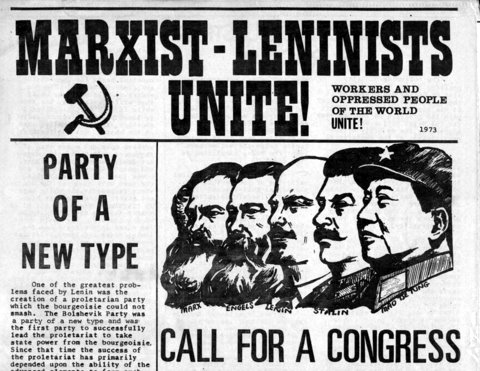
The initial basis of unity of the NCC was the following three points:
1. That the primary task of Marxist Leninist organizations and advanced workers is to build an honest Multi-National, Marxist-Leninist Communist Party in the United States–“a Party of a New Type”–to unite and lead the struggles of the U.S. working class in the seizure of State power and establishment of the Dictatorship of the Proletariat. The Committee realized that this could be done only by strict adherence to and defense of the science of Marxism-Leninism, and by an all out assault against the CPUSA and all forms of revisionism and opportunism.
2. That a Party Congress should be called in about a year to organize such a Party within the U.S.
3. That the draft resolutions adopted at the Conference should be the minimum political line holding the committee together and enabling it to carry out the necessary organizational work for the Party Congress. Finally, that any organization or individual which agreed with these points and the draft resolutions should be encouraged to join both Local Continuation Committees and the National Continuations Committee.
The National Continuations Committee, staffed primarily by CL cadre, printed and distributed “Marxist-Leninists Unite!”; put out a newsletter “for political discussion and news in preparation for the Congress”; coordinated work between the various organizations on the NCC; helped organize and coordinate the work of Local Continuations Committees; and made preparations for the forth-coming Congress. Local CCs were established in a number of cities including the Bay Area, Chicago, Detroit, and Sacramento.
The NCC was created in a period when other major New Communist Movement organizations – like the Revolutionary Union and the October League – did not consider the formation of a new Communist Party to be on the immediate agenda. As such, the NCC was able to attract the interest of those anti-revisionist groups which did. These included national organizations like the Black Workers Congress (BWC), the Puerto Rican Revolutionary Workers Organization (PRRWO), and the August 29th Movement (ATM), and local groups like the New Voice (California) and the League for Proletarian Revolution (Bay Area). The perspective of the NCC was further enhanced and disseminated nationally by the publication of The Struggle for the Party by the New Voice’s Charles Loren and the debates that followed it.
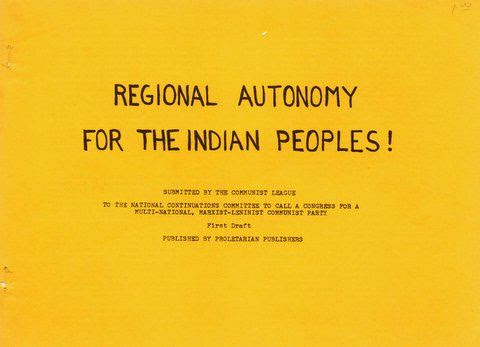
However, the NCC process failed to hold these groups together. The attempt by the CL to impose democratic centralism within the NCC, together with its public articulation of certain positions, most notoriously, that capitalism had not been restored in the Soviet Union, resulted in the successive abandonment of the NCC by all the major national groups – BWC, PRRWO, ATM, and by the New Voice.
If the NCC was a failure at uniting Marxist-Leninists at the national level, it had more success in at least one local area – Detroit. Here the CL had previously incorporated important elements of the League of Revolutionary Black Workers (LRBW) around General Baker and Chuck Wooten, with their base among Black workers in the auto plants, in the same period that saw another former section of the LRBW form the BWC. The Detroit CL succeeded in bringing the Motor City Labor League (MCLL) into the Local CC. The MCLL, a former mass organization, created in 1970 by the LRBW to support local workers’ struggles, was a significant force in the Detroit left: “at one time or another in its development [it] contained all the active indigenous white radicals in the city.” (Dan Geogakas, Marvin Surkin, Detroit: I Do Mind Dying (St. Martin’s Press, 1975)). In 1972, the MCLL had undergone a major split; the majority elected to transform the group into a Marxist-Leninist organization, and in 1974 it joined the local CC.
Over the Labor Day weekend in Chicago 1974, the CL, the MCLL and the remaining elements of the NCC met and founded the Communist Labor Party (CLP). Attending the founding congress, in addition to the CL and MCLL, were the League for Proletarian Revolution (Bay Area), the Capital Collective (Detroit), Closer To It newspaper (Akron, Ohio), the San Jose Study Group, the Mateo County Marxist-Leninist Organization, and the Joe Stalin Study Group.
Thereafter, the CLP never recaptured the national prominence in anti-revisionist circles it had garnered during the NCC period. Detroit continued to be a center of CLP activity; in 1976 and again in 1978 it conducted “Vote Communist” campaigns running General Baker for the Michigan House of Representatives.
In 1993 the CLP changed its name, first to the National Organizing Committee, and then to the League of Revolutionaries for a New America.
Conference of Marxist-Leninists Brings New Unity by the Communist League [People’s Tribune, Vol. 5, No. 5, June 1973]
[Report on] The Conference of North American Marxist-Leninists by the Communist Collective of the Chicano Nation
Sham Congress Called by Communist League by the October League (Marxist-Leninist)
The Communist League: Class Struggle or Class Collaboration? by the Spartacist League
The Reactionary Line of the “Communist League” by the Revolutionary Union
The Future is Bright: A Response to the Communist League by the October League (Marxist-Leninist)
CL is Leading the “National Continuations Committee to Call a Congress for a Multi-National Marxist-Leninist Communist Party” Down a Trotskyite Road of Lies and Distortions by the Black Workers Congress
Which Side Are You On? [On the BWC Polemic Against CL] by Carl Davidson
IWK Statement on the Communist League and the National Continuations Committee by I Wor Kuen
Summary of the NCC Process, the Founding of the CLP, and the Role of the League for Proletarian Revolution by the Marxist-Leninist Collective
The Puerto Rican Revolutionary Workers Organization and the National Continuations Committee by I Wor Kuen
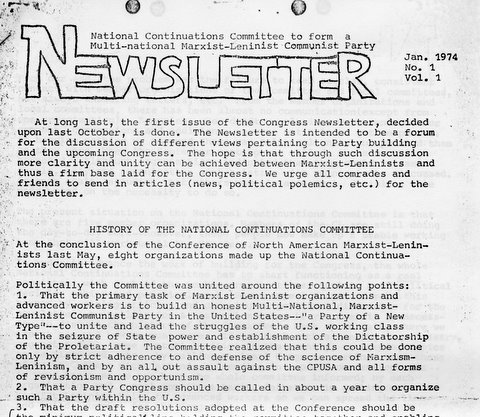
Resolution of the Conference of North American Marxist-Leninists on Creating a Continuations Committee [People’s Tribune, Vol. 5, No. 5, June 1973]
The National Continuations Committee Newsletters
Letter from the National Continuations Committee to the Detroit Local Continuations Committee
Political Statement of the League for Proletarian Revolution
Appalachia by the Communist League
Regional Autonomy for the Indian Peoples! by the Communist League
Against Revisionism by Michael A. Miller, The League for Proletarian Revolution
Free the Negro Nation! by the League for Proletarian Revolution
Letter from the Staff of Closer To It
A Veteran Communist Speaks... On the Struggle Against Revisionism by Admiral Kilpatrick
Letter from the Black Workers Congress Secretariat to the BWC on attempting to join the NCC
Statement on the Expulsion of the Black Workers Congress from the National Continuations Committee by the Communist League
Imperialism Today: An Economic Analysis by the New Voice
Comradely Polemics on Imperialism by the Communist League
Three Articles on the Bribe by the New Voice
The International Significance of the Restoration of Capitalism in the USSR by the League for Proletarian Revolution
Class Struggle in the USSR by the Communist League
The International Significance of the Restoration of Capitalism in the USSR, Part II by the League for Proletarian Revolution
Proposed Agenda for Formation of Bay Area ML Circle
Minutes of the Circle Meeting, April 29, 1974
Proletarian Revolution and the Emancipation of Women. Two Speeches Given at a Forum on International Women’s Day in San Francisco, Sponsored by the Communist League, the San Francisco Marxist-Leninist Organization, and the League for Proletarian Revolution
Proposed Agenda for a Two Day Meeting by the Continuations Committee
Study Guide for Circle Struggle on Party Building
Summary of Circle Meeting, June 9, 1974
Notes on the Circle Meeting, June 16, 1974
Stalin and the Dictatorship of the Proletariat
The USSR is a Social Imperialist Country
On the Restoration of Capitalism in the Soviet Union
CL’s Line Does Not Adhere to the Science of Marxism-Leninism and Conciliates with Modern Revisionism by the Black Workers Congress
Summary of the NCC Process, the Founding of the CLP, and the Role of the League for Proletarian Revolution by the Marxist-Leninist Collective
History of the Communist Labor Party – USNA, Detroit Section
Statement of the Cass-Trumbull Collective on Not Joining the National Continuations Committee
The Communist League: Class Struggle or Class Collaboration? by the Detroit Spartacist League
Uniting Theory and Practice by the Detroit Collective
Detroit Collective Statement: “Party Must Be Built Through Struggle”
Report from the Detroit Continuations Committee
Reply to the Anti-Party Bloc by the Detroit Local Continuations Committee
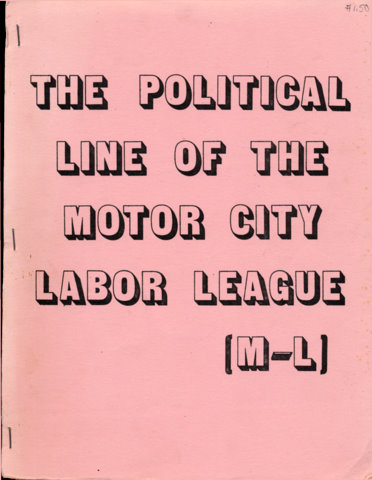
The Political Line of the Motor City Labor League (M-L)
To the Central Committee for All Members of the Motor City Labor League [resignation letter of nine comrades]
From the Masses, To the Masses by A Study Group
Where We’re At; Where We’re Going by the MCLL Central Committee
Party of a New Type by the Motor City Labor League
The Building of Cadre as Political Leadership in the Process of Building the Multi-National Anti-Revisionist Communist Party by the MCLL Central Committee
Opportunism in the Formation of the Party: A Position Opposed to “A Study Group” Participating on the Continuations Committee by the Motor City Labor League
From Something, Through Something, To Something by the MCLL Central Committee
What road for party building? by the Motor City Labor League (M-L)
Response to Guardian-RU Attacks on the CL and MCLL
[Back to top]
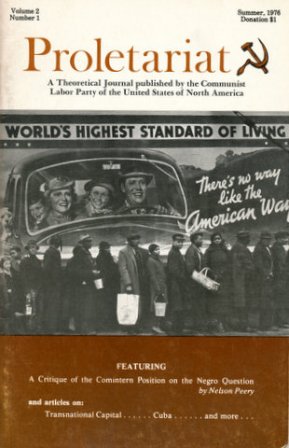
A History of Struggle [from Michigan Ballot Special issue of People’s Tribune, n.d.]
Self Criticism [on ’A History of Struggle’] [People’s Tribune, Vol. 3, No. 26, December 15, 1976]
Origin of the CLP [from Michigan Ballot Special issue of People’s Tribune, n.d.]
CLP Different from CPUSA [from Michigan Ballot Special issue of People’s Tribune, n.d.]
A Tribute to Bill Watkins by W. F. Santiago-Valles
What is the Communist Labor Party? [from Workers Vanguard, No. 56, November 8, 1974]
Look Who’s Backing Soviet ’Peace’ Proposal! by the October League (M-L)
CLP Embraces Detente, Workers Vanguard, August 1, 1975
Ethiopian Students Protest CLP Forum by the October League (M-L) [The Call, Vol. 6, No. 46, November 28, 1977]
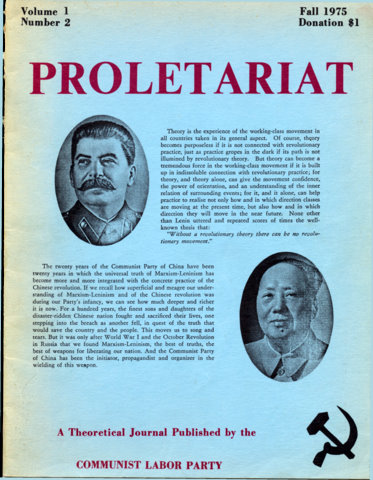
Greetings to the Congress from the Ethiopian Revolutionary Committee [People’s Tribune, Vol. 6, No. 8, August 1974]
Documents of the First (Founding) Congress of the Communist Labor Party (1974)
Boston: Busing Crisis Stirs Class Divisions [from People’s Tribune, Vol. 1, No. 1, September 1974]
Are You Ready to Die for Rockefeller’s Millions? [leaflet]
A Veteran Communist Speaks by Joe Dougher
China’s Revolution is the Continuation of the Great October Revolution – A Refutation of Lin Piao by T.S., Chicago
On the Situation in Cuba by Comrades in the Southwest
On Certain Theoretical Aspects of the Marxist-Leninist Analysis of Fascism; Dialectics of Revolution and Counter-Revolution by M.M., Chicago
The Boston Busing Crisis: Liberalism as the Breeding Ground for Fascism
CPUSA Attacks Lenin, Stalin [from People’s Tribune, Vol. 2, No. 3, February 1, 1975]
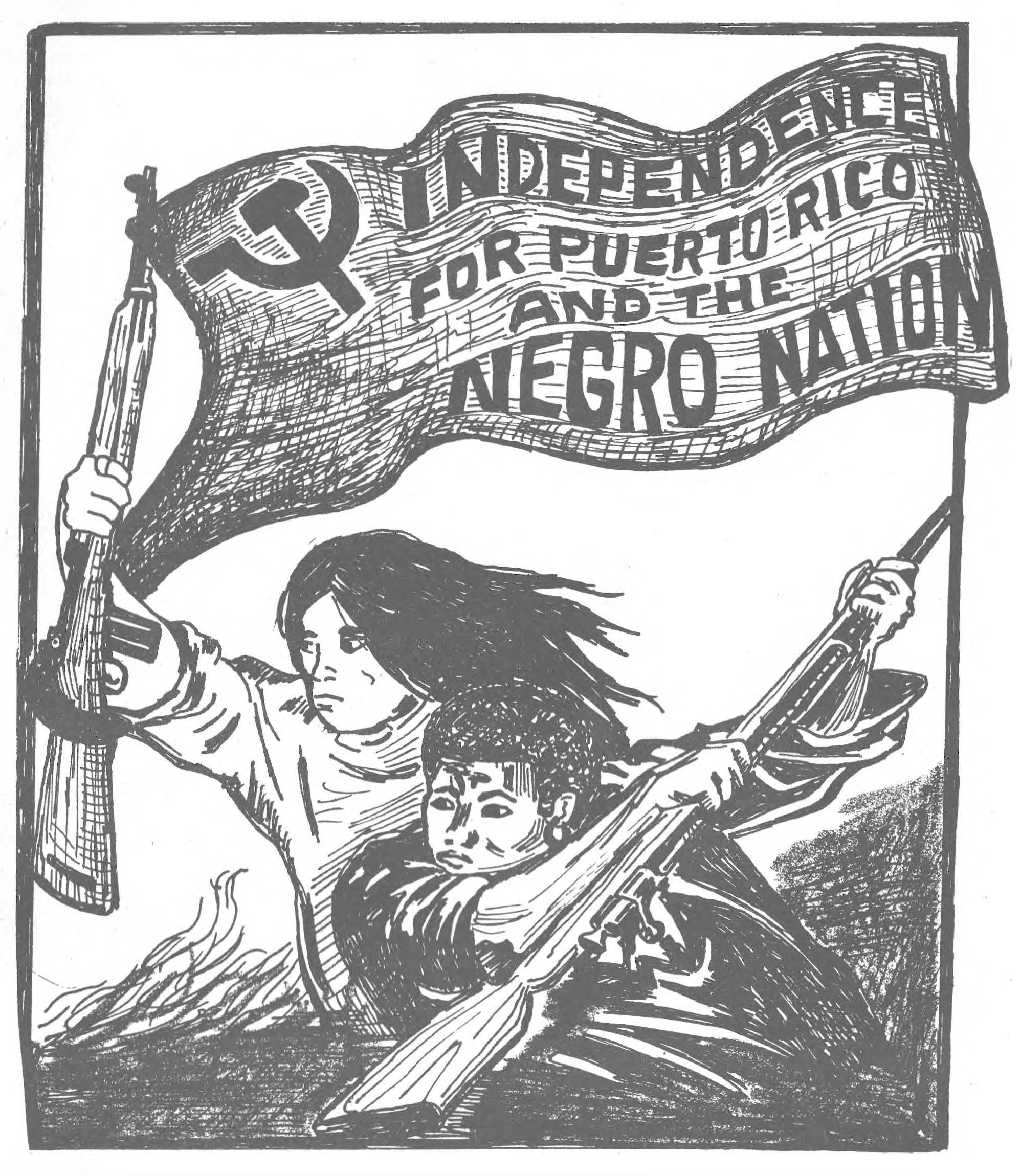
Smash the Nazi Party!! [demonstration flyer]
Youth in Struggle, Vol. 1, No. 1, July 1975 [Official Newsletter of the L.A. Young Communist League]
A Veteran Communist Speaks: Akron Rubber Workers’ Strikes of 1936 by Jim Keller
Proposal for the Formation of a National Film Organization [from Black Graphic International, No. 20, Fall-Winter 1975]
Report from the Secretariat [to the Second Plenary Session of the First Central Committee]
Onward to Second Congress [People’s Tribune, Vol. 2, No. 22, November 15, 1975]
Materials in Preparation for the Second CLP Congress
Opening Remarks from the General Secretary to the Second Congress of the CLP
Documents of the Second Congress of the Communist Labor Party (1975)
Socialism in the USSR, Part 1 [People’s Tribune, Vol. 2, No. 24, December 15, 1975]
Socialism in the USSR, Part 2 [People’s Tribune, Vol. 3, No. 1, January 1, 1976]
Hungary 1956, Part 1 [People’s Tribune, Vol. 3, No. 2, January 15, 1976]
Hungary 1956, Part 2 [People’s Tribune, Vol. 3, No. 4, February 1, 1976]
Louisville – Busing Splits Labor [People’s Tribune, Vol. 3, No. 6, March 1, 1976]
Self Criticism [on Louisville busing article] [People’s Tribune, Vol. 3, No. 7, March 15, 1976]

Equal Rights Congress [Western Worker, Vol. 2, No. 12, November 1, 1975]
National Report – Build the ERC
Equal Rights Congress – Resolutions of the Founding Convention
* * *
Statement on 25th Congress CPSU [People’s Tribune, Vol. 3, No. 11, May 15, 1976]
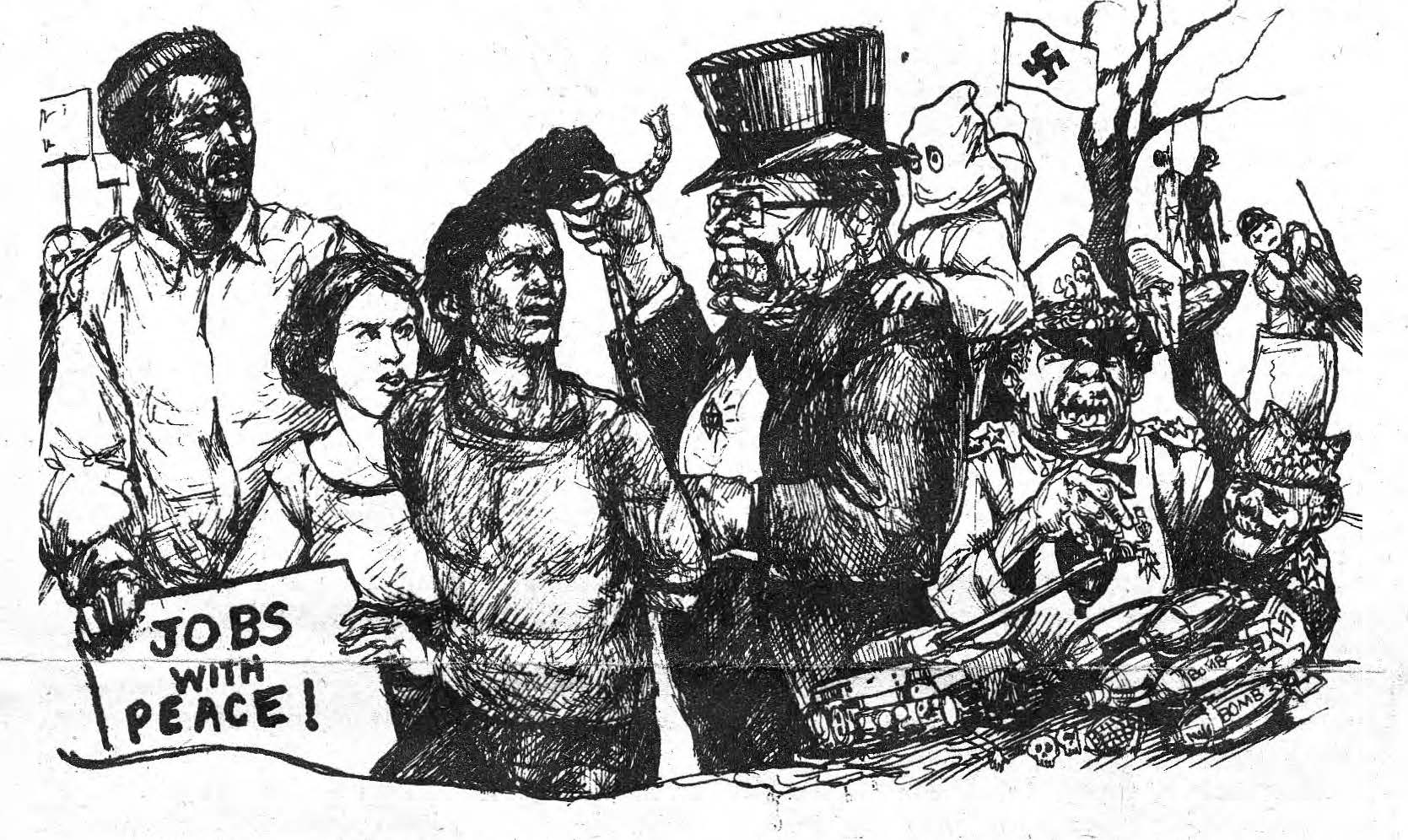
Jobs, Peace, Equality – The Communist Labor Party
Jobs with Peace by J. Freed
The Comintern Position on the Negro Question. A Review of H. Haywood’s Negro Liberation by Nelson Peery [from Proletariat, Vol. 2, No. 1, Summer 1976]
USNA Imperialism and the Immigration of Mexican Workers into the USNA by K. R., Tucson [from Proletariat, Vol. 2, No. 1, Summer 1976]
Fascism: The Cost American Cannot Afford! [draft pamphlet]
Land and Equality: A Hundred Years of Struggle in the Southwest [People’s Tribune, Vol. 3, No. 15, July 1, 1976]
Open Letter to the C.P.U.S.A. [People’s Tribune, Vol. 3, No. 15, July 1, 1976]
Open Letter To US-China People’s Friendship Association
China Struggle Intensifies [on the Gang of Four] [People’s Tribune, Vol. 3, No. 23, November 1, 1976]
Repeal Section 14(b) of the Taft-Hartley Act by General Baker, Jr.
Socialism in the Soviet Union by Jonathan Aurthur
Political Bureau Report to the Central Committee, September 2, 1978
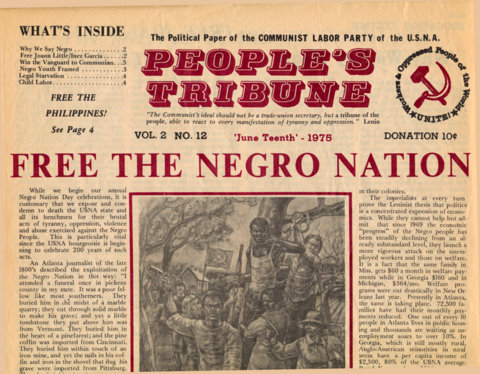
Party Organizer, Vol. 1, No. 2, October 1974
CLP Organizer, Vol. 2, No. 1, January 1975
Party Life, Vol. 4, No. 1 [n.d.]
9th District Tribune, no date; September 1, 1976
Adelante, Vol. 1, No. 1 [March 10, 1976]
Blood - Sweat - Tears, [no date]
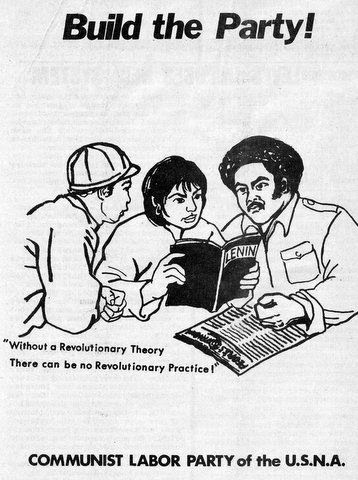
C.R.A.F., Vol. 2, No. 5; Vol. 2, No. 7
Finally Got the News, Vol. 1, No. 1; Vol. 1, No. 4
Fleetwood Fortress, Vol. 1, No. 1; Vol. 1, No. 3
The Ford Tribune, Vol. 1, No. 1; Vol. 1, No. 2; April 9, 1976, April 13, 1976
The Hammer, Vol. 1, No. 1
The Highland Park Red Line, Vol. 1, No. 1; Vol. 1, No. 3
Hutzel Tribune, Vol. 1, No. 3; Vol. 1, No. 4; Special Issue
The Plymouth Fury, Vol. 1, No. 3; Vol. 2, No. 1; Vol. 2, No. 2
Red Chip, Vol. 1, No. 1; no date; Blackmail!
Red Gear and Axle, Vol. 1, No. 1
Red Medicine, Vol. 1, No. 2
Red Worker Lynch Rd. Assembly, Vol. 1, No. 1
Sterling Heights Stamping Tribune, Vol. 1, No. 1
Spirit of 17, Vol. 1, No. 1
Teacher's Tribune, September 2, 1975; October 9, 1975
Truck Tribune [January 20, 1976]
The Worker's Pulse, Vol. 1, No. 1
Worker's Voice, no date
The Democratic Lawyer [political newspaper of the Communist Labor Party fraction of the National La Raza Law Students]
The Democratic Lawyer [political newspaper of the Communist Labor Party fraction of the National Lawyers Guild]
[Back to top]
The Central Organization of US Marxist-Leninists was formed when the ACWM(ML), the Association of Communist Workers, and the Lexington Communist Collective united at the Conference of American Marxist-Leninists of August 1973. A small Bay Area collective, Red Banner (ML), also joined at the Conference and took part in the new organization for awhile, but then left. Two other participants in the Conference – the Red Star Cadre and the Red Collective – agreed to join COUSML and were listed as among its founders, but they never actually took part in the work of the organization; later, these groups would be revealed as fake collectives whose leaders Joe Burton and Jill Schafer were FBI operatives [see the documents in the sub-section “FBI Infiltration” in the section “Conference of North American Marxist-Leninists” above].
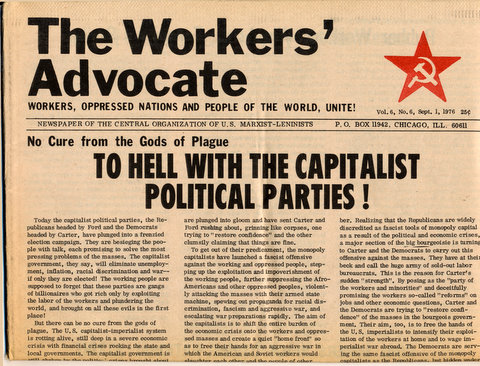
The theoretical-political positions of COUSML evolved considerably over time. It started out ardently Maoist and ended up denouncing Mao Zedong Thought. While allied with the Communist Party of Canada (Marxist-Leninist) internationally for nearly all of its history, it was eventually denounced in extreme terms by the late Hardial Bains, leader of the CPC (ML).
But while its views evolved, COUSML’s basic orientation remained the same: to rebuild a communist party on an anti-revisionist basis. In party-building, it emphasized revolutionary theory and, in particular, carrying out open communist agitation among the masses.
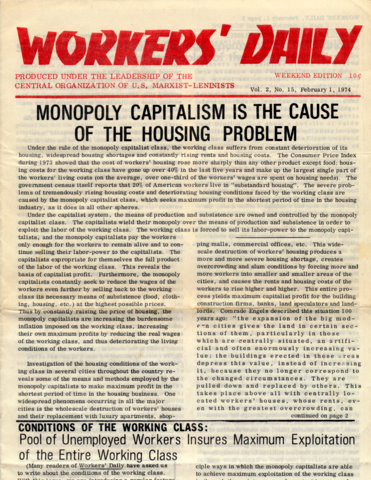
Starting in late 1976, COUSML stressed the importance of opposing the “three worlds” theory promoted by the Chinese Communist Party and the line of “striking the main blow at Soviet social-imperialism”. It held that these positions were “lines of demarcation” within the US Marxist-Leninist movement and carried out a campaign in 1979 to unite communist activists opposed to “three worldist social-chauvinism” into a single anti-revisionist communist party. This led to the founding of the Marxist-Leninist Party of the USA on January 1, 1980.
Central Organization of U.S. Marxist-Leninists Formed!
What is the Stage of the Proletarian Revolution in the U.S.?
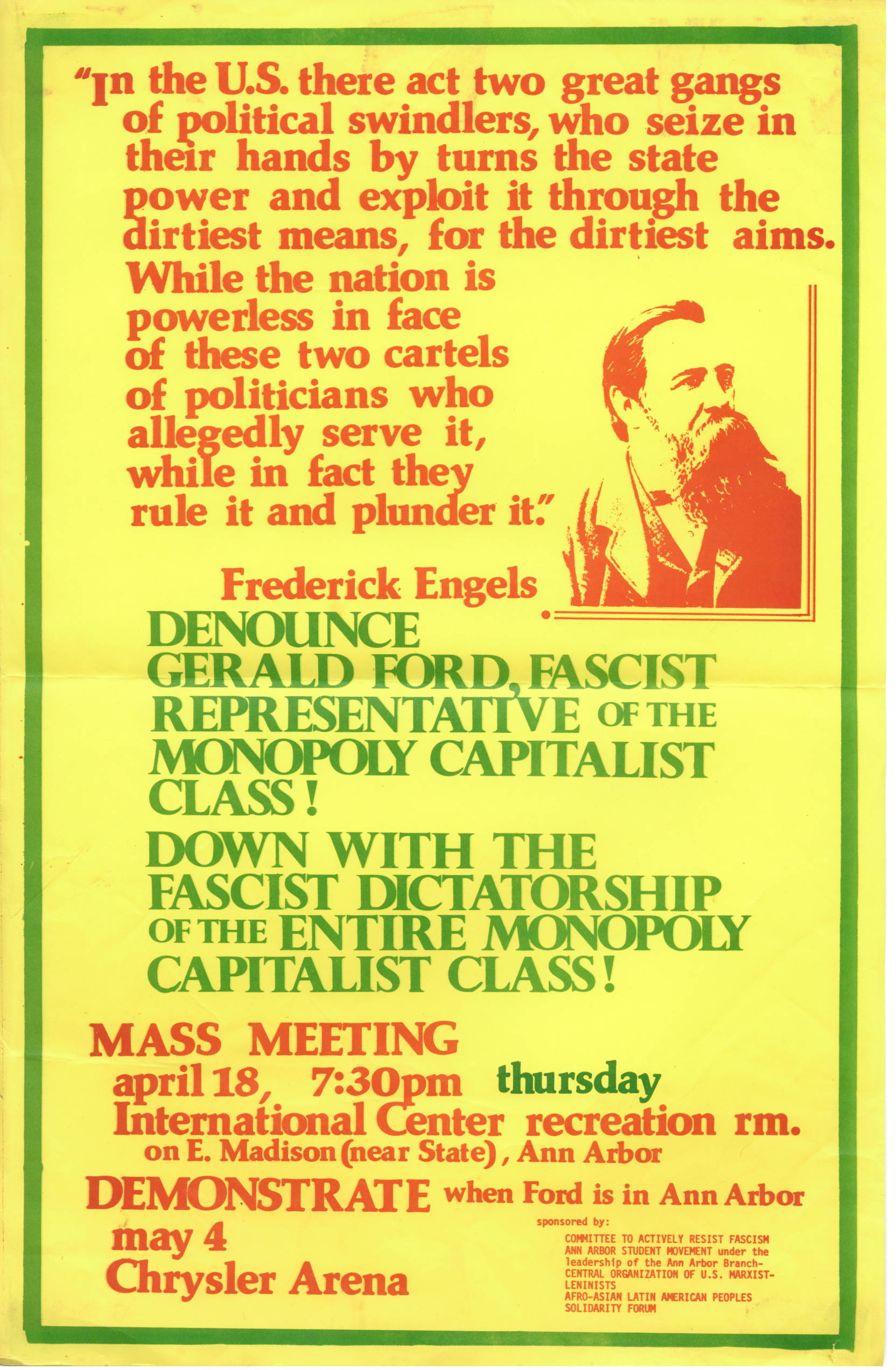
Afro-American People: Advance the Struggle Against Racial Discrimination and Violent Repression! by the Seattle Workers Movement under the leadership of the COUSML
Communists Resist Anti-busing Fascists at Louisville Factory
Mao Tsetung Thought Versus Opportunism
MAO TSETUNG THOUGHT WILL SHINE FOREVER!
Once Again on the OL’s Social-Chauvinist Theory of “Directing the Main Blow at Soviet Social-Imperialism” by the Central Organization of U.S. Marxist-Leninists
Mao Tsetung and Mao Tsetung Thought are Anti-Marxist-Leninist and Revisionist
[Back to top]
Bay Area Rallies to ’Dump Nixon’
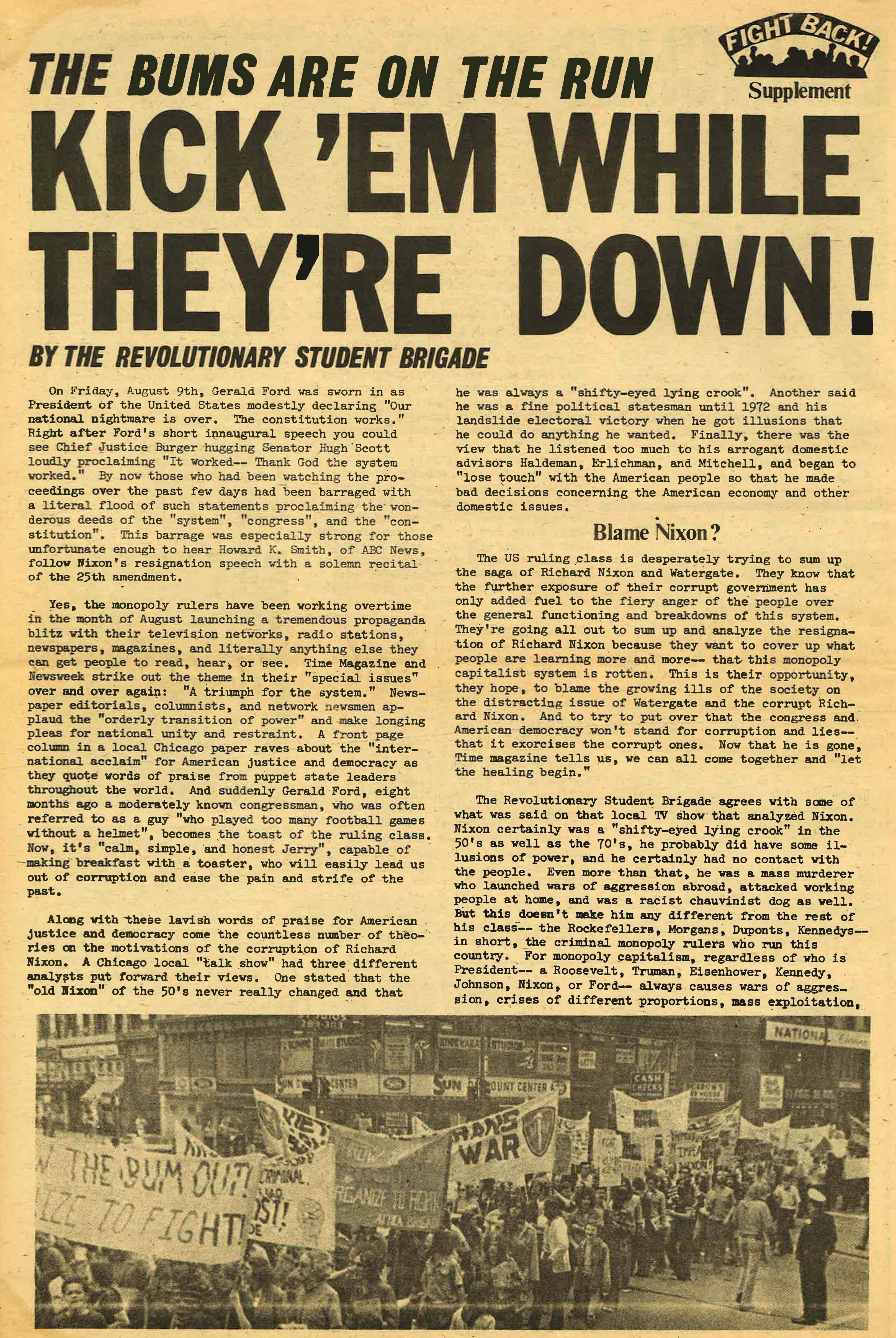
The Relationship Between the Struggle for Democracy and the Struggle for Socialism by Barry Litt
Fascism in the U.S.? by Don Hamerquist
Richard Nixon Blames American People for Watergate Workers’ Daily News Release, Vol. 1, No. 2., September 13, 1973
Publisher’s Preface to the reprint of Dimitrov’s “The United Front Against War and Fascism”
Bad Caricature [letter from Dave Davis to The Guardian]
Nixon and Watergate: Toughing It Out
Down with the Nixon Gang! [from People’s Tribune, Vol. 5, No. 4, May 1973]
Watergate: Political Crisis Escalates
Gus Hall on Watergate and Brezhnev’s Visit: CPUSA Defends Imperialists [from People’s Tribune, Vol. 5, No. 6, July 1973]
Watergate: Platform for Political Exposure [from People’s Tribune, Vol. 5, No. 7, August 1973]
Both Sides of the Fascist Coin! Nixon And His Phoney Critics
Watergate Struggle Escalates: Toppling Governments Signal USNA Hegemony
Nixon Pardoned – Working Class Indicted!
America Nears Fascism... Suppose Nixon Won’t Resign... and Refuses to be Impeached?
No! The People Do Not Pardon You Nixon!!
Hundreds attend forum on Watergate
Bad Caricature [letter from Dave Davis to The Guardian]
Watergate: The Unmaking of a President
Watergate and the Fascist Threat
Editorial: Dump Nixon! Stop the Fascist Tide!
Capitalist Crisis Brings Impeachment Moves [The Call, Vol. 2, No. 3, December 1973]
Congress Paralyzed – Dump Nixon
“Unparalyze Congress or Organize to Fight? by the Revolutionary Union
Call Editorial: Nixon Dumped But Real Fight Ahead
Progressive labor Party Says: Today’s Liberal Billionaires Are the Fascists of Tomorrow
Watergate “Good Guys” Are Imperialist Butchers. NY Times: All The News That Fits Wall St.
Criticisms of “Watergate” Line by Jon Harris [PLP Convention Bulletin #10]
Editorial: Watergate: Old Billionaires Knife New – Panic Over Sick Economy [PL magazine, Vol. 9, No. 2, July 1973]
Progressive Labor Party Says: Watergate: Nothing’s Changed; Same Old Billionaires’ Dogfight!
Progressive Labor Party Says: While Bosses Fight One Another for $$’s, Workers Should Drown Them All in WATERgate [Challenge, April 18, 1974]
Watergate and the Response to it by Various NCM Groups from In the U.S. Pregnant with Revisionism
“Unparalyze Congress or Organize to Fight?
The Bums Are On the Run – Kick ’Em While They’re Down!
The Meaning of Watergate [Venceremos, Vol. III, No.6, May 25-June 7, 1973]
Nixon and Ford: Whence the Differences? [Workers Viewpoint, Vol. 1, No. 2, September 1974]
[Back to top]